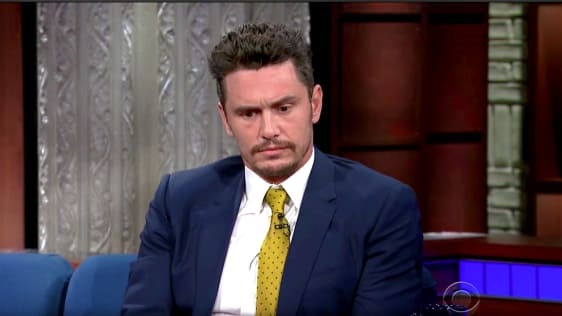James Franco’s Carefully Worded Denial Of Sexual Misconduct Claims Raises Lots Of Questions
UPDATE: Since Fast Company published the below post, The Los Angeles Times has put out an in-depth exposé on James Franco in which five women accuse him of inappropriate or sexually exploitative behavior.
James Franco had less than a day to bask in his Golden Globes victory–he won Best Actor in a Comedy for his role in The Disaster Artist–before the headlines that have become all too familiar zeroed in on him.
Like almost everyone attending the Golden Globes, the actor wore a Time’s Up pin to lend support to the surging anti-sexual harassment movement. His pin struck some people as hypocritical, including actor Ally Sheedy, who wrote (and later deleted) a cryptic tweet linking Franco to her decision to leave Hollywood and suggesting his presence at the Globes was inappropriate. (Franco directed Sheedy in a 2011 off-Broadway play but there is no on-record rancor between them.) Around the same time, actor Violet Paley, who once dated Franco, wrote a far more damning message, accusing the actor of pushing her “head down in a car toward [his] exposed penis” and hitting on her 17-year-old friend. Another actor, Sarah Tither-Kaplan, also suggested on Twitter that Franco had exploited her in nude scenes for his films. These accusations received wide attention throughout the day Monday, and by Tuesday night, The New York Times had canceled an event with Franco, who then found himself having to discuss the allegations on Late Show with Stephen Colbert. The light-speed reaction to accusations that arrive without a well-sourced exposé reveals the evolving nature of the #MeToo movement.
Franco’s interaction with Colbert was far less adversarial than John Oliver’s confrontation with Dustin Hoffman last month. For one thing, this portion of the interview started off with Colbert mentioning that he’d asked Franco backstage if he would be up for talking about it on the air. So Franco was ready (and perhaps coached) to engage meaningfully with the tough subject matter. (Compare that to where we were around last year’s Golden Globes, when Casey Affleck was repeatedly allowed to deflect questions about his own alleged abuse of women.)
“You got criticized for wearing a Time’s Up pin,” Colbert said, gently leading the actor to a place he almost certainly would rather not be headed on national TV (heads-up or not). “Do you know why, and do you have a response?”
Franco first reasserted his support for the movement in general and added that he specifically supports women and underrepresented communities getting equal pay and equal representation in leadership positions. Either as damage control or a sincere statement, this was an effective opener. The audience was on his side too, applauding him. Just hearing a live TV audience react to a powerful man responding for the first time to allegations of sexual misconduct against him, though, shows how strange the post-Weinstein Hollywood atmosphere has become.
The transition to the accusations themselves was less smooth.
“There were some things on Twitter,” Franco began. “I haven’t read them, I’ve heard about them.” It’s an odd clarification because, um, if you know there are serious allegations against you in this climate, maybe have a look at them yourself? Wouldn’t anyone in that position want to have all the facts?
“I don’t know what I did to Ally Sheedy,” he continued, adding that he has “total respect” for her. He also mentioned, almost as an aside, that Sheedy took the tweet down, as though that were proof of some kind of exoneration, rather than an invitation for an avalanche of questions.
Next, Franco addressed both Paley’s and Tither-Kaplan’ accusations collectively (perhaps strategically) as “the others.” Was he implying that there are other accusations forthcoming? Was he referring to Paley and her then-underage friend? Or was he lumping in with Paley’s friend the other 17-year-old woman he hit on via Instagram about four years ago?
Next came his nuanced denial, crafted with maximum vagueness. “The things I heard about on Twitter were not accurate,” Franco said. “But I completely support people coming out and being able to have a voice because they didn’t have a voice for so long.”
It’s a masterful pivot away from discussing what exactly transpired between Franco and Paley, which we couldn’t expect Colbert to ask him to do anyway. During the rest of the interview, Franco promised to make “restitution” to his alleged victim if he can, and listen to women on the broader issues so that he can “change [his] perspective where it’s off.” This tactic is now familiar, and at this point, anyone who has ever been harassed must be sick of hearing an alleged abuser deny his accuser’s account while simultaneously applauding her for coming forward with it.
It’s difficult to draw any conclusions about Franco until we hear more from Sheedy (as well as the actor’s mysterious “others”). From the information that is public, though, it sounds as if Franco may truly be learning that the way he behaved with someone he was dating–and perhaps with two 17-year-olds–was wrong and unacceptable. Meanwhile, we are all learning how to form opinions about men accused of varying degrees of inappropriate behavior. Do we believe Twitter accusations or only deeply reported pieces? Do we heed only established mainstream outlets like the New York Times and The Hollywood Reporter or The Daily Caller as well? Just this morning, Michael Douglas released a pre-emptive denial of allegations against him that haven’t been made public yet, in an apparent attempt to cut off the story at the pass. It’s more likely his decision will inspire even more scrutiny.
Franco and Douglas are not out of the woods yet.
And neither are we.
Fast Company , Read Full Story
(34)














